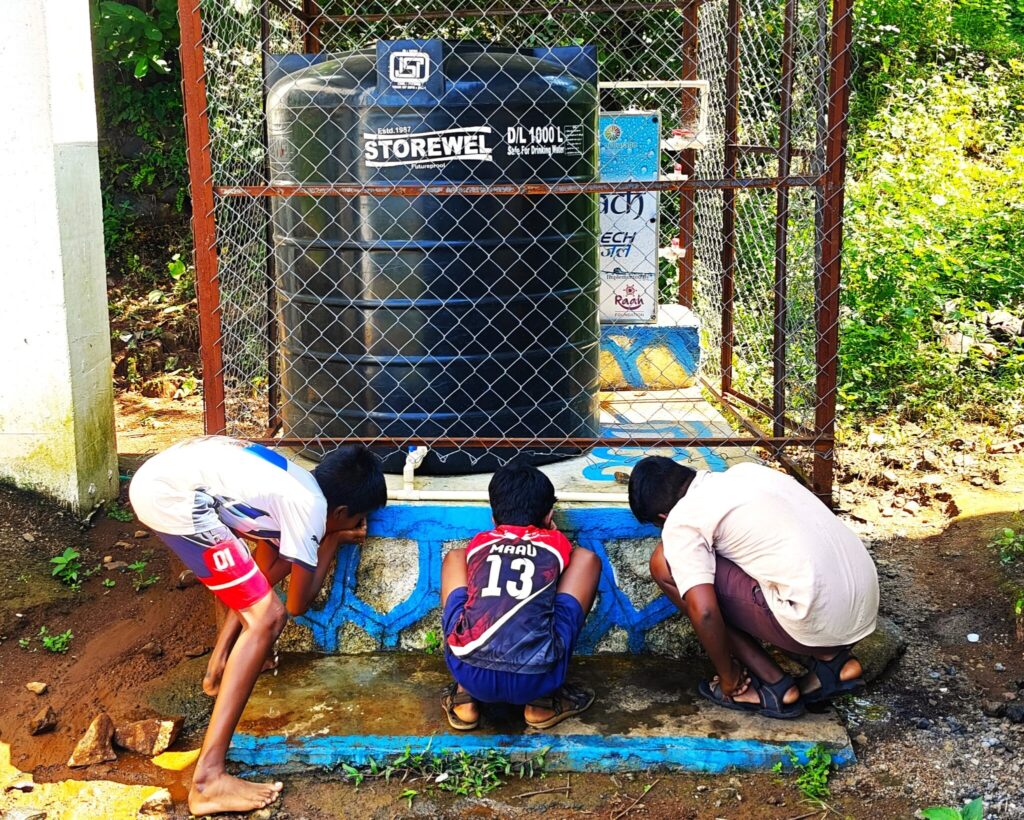In remote tribal villages like Khand, Kolipada, Uganipada, and Kharpadpada in Palghar district, Maharashtra, water is more than a resource—it’s a daily negotiation for dignity, health, and time. Despite growing infrastructure, water security cannot be sustainably achieved without a cultural shift in how we perceive hygiene, sanitation, and ownership.
At Raah Foundation, we’ve come to realize that in the long-term pursuit of water security, hardware alone cannot deliver impact—mindsets do.
That’s why, alongside the installation of community-based water filtration units, we implemented an integrated WASH (Water, Sanitation, and Hygiene) training program—tailored not just to needs, but to pace, language, and lived realities.
Turning Training into Transformation
Our approach was simple, yet bold: start with listening, not instruction. What began as traditional training soon evolved into community-rooted learning spaces. We quickly learned that long sessions don’t work in villages where daily life demands attention. So, we pivoted—breaking the content into short, interactive modules.
Games that taught how germs spread. Roleplays that made sanitation visual. Conversations that weren’t lectures, but dialogues. With every session, we moved closer to what we ultimately needed: behaviour change that sticks.
Key Pillars of Our Approach:
- * Cultural Relevance: Sessions delivered in the local dialect, respecting community schedules
- * Participatory Training: Practical demonstrations, peer-led exercises, and storytelling
- * Trainer Capacity-Building: A Training of Trainers (ToT) model, mentored by community expert Mr. Prakash Wagh
- * Behaviour Change Communication (BCC): Reinforcement through visual cues, repetition, and community accountability
From Practice to Pattern: What Changed?
Small indicators began to surface.
- * Children started using clean, drinking water bottles.
- * Women covered water storage vessels.
- * Hamlet surroundings near water points grew visibly cleaner.Each of these moments reflected a shift not just in behaviour, but in mindset. Hygiene wasn’t just a campaign message—it was becoming a community value.
The Bigger Picture: WASH as a Foundation for Resilience
In regions like Palghar, where terrain, remoteness, and climate variability intersect, WASH is more than a health intervention—it’s a strategy for resilience. As climate change increasingly affects groundwater levels and surface water quality, community-driven hygiene and water stewardship becomes our best insurance.
What we’ve witnessed is not just a project rollout—it’s a model of scalable, participatory infrastructure paired with human-centric capacity building.
The Impact We See
- * Strengthened community-led monitoring systems for accountability:(Water Governance Committees – Malhar Samiti: Enabling Local Leadership for Water Security)
Raah Foundation’s Water Governance Committees, known locally as Malhar Samitis, are community-led institutions formed to ensure the sustainable management of water infrastructure and resources at the village level. Established under our broader Water Security programme, these committees are a strategic step towards decentralizing water governance, enhancing accountability, and fostering long-term community ownership.
Each committee is structured with clear roles—a Chairperson, Vice Chairperson, Secretary, and five Members—who collectively manage daily operations, water budgeting, and infrastructure maintenance. From overseeing filtration units and ponds to monitoring water quality and maintaining usage records, the committee ensures that water systems function efficiently and equitably. Through regular training and awareness programs, they also act as ambassadors for hygiene, conservation, and safe water practices within their communities.
Critically, Malhar Samitis serves as a bridge between communities and local government. By managing village-level water funds, conducting need assessments, and coordinating with public schemes, they enhance the reach and impact of water infrastructure investments. The model reduces dependence on external actors by building resilient, self-governing mechanisms rooted in the local context.In essence, these committees are more than just functional bodies—they are custodians of community resilience, ensuring that water remains not just a resource, but a shared responsibility.
- * Shift from donor-led to community-owned water security frameworks
The trained committee members will also ensure the use of simple water testing kits, enabling routine water quality checks independently. This will ensure the effectiveness of filtration systems, detect contamination early and take corrective actions consequently promoting confidence and trust in the community regarding water safety Ongoing testing and monitoring form a key part of the water governance strategy, ensuring safe and sustainable access to potable water for all villagers.
At Raah Foundation, we believe that real progress is when clean water flows—and communities rise to protect it. Hygiene is no longer just a public health concern; it’s the cornerstone of climate-resilient, dignified living.
Because a water purifier alone cannot create health. But a community that understands, owns, and sustains hygiene practices—can.
Let’s invest in more than systems.
Let’s invest in people-powered change.

